- Home
- Daniel Quinn
The Holy Page 2
The Holy Read online
Page 2
CHAPTER 2
Aaron’s house was indeed what Howard considered a mansion, although it stood at no great distance from either the street or its stately neighbors. It pretended to no particular architectural style he could recognize; it was just a handsome and substantial dwelling built for some rich merchant of the 1920s.
The door was opened by a woman of striking presence, reminding him of a young Olivia de Havilland. When he gave her his name, she said, “Mr. Fischer is expecting you. Will you come this way, please?” with the cool competence of an executive secretary. As they walked, he asked her if she was Mr. Fischer’s personal assistant. With a faint smile, she replied that she was his personal assistant, housekeeper, and everything else, short of cook and maid-of-all-work.
“Would you mind telling me your name?”
“Not at all,” she replied. “It’s Ella.”
The room she led him to was huge, bright, and exquisitely furnished, and he wondered if it was known in the household simply as the living room. It certainly wasn’t a room where you kicked off your shoes and settled down in front of the TV with a six-pack of beer. The furniture had the glow of great antiquity and value, and a picture sprang to his mind of its being burnished daily with wads of old, velvet-soft money. The pettiness of this reaction dismayed him, and, as Aaron approached to greet him across a vast Chinese rug in luscious reds and blues, he wondered what he was going to do about it. Then, almost without the aid of his brain, his tongue handled it for him.
“You got one hell of a sexy place here, Aaron,” he said, nodding appreciatively.
The old man’s head jerked back as though he’d been slapped. He stopped, appraised Howard’s smile, and then looked around slowly, trying to see the room through Howard’s eyes. Finally he chuckled and said, “Yeah. Real sexy.”
He took Howard’s arm affectionately.
Howard was relieved when, after a cocktail in the living room, Aaron led him to a small, octagonal dining room built out into the backyard—practically open to the backyard by virtue of its French windows. He’d had a chilling vision of their dining in a baronial hall, at opposite ends of a furlong-wide banquet table.
“This is the breakfast room, actually,” Aaron pointed out. “Entertaining in the dining room makes me feel like Count Dracula in his castle.”
The meal itself, served with watchful courtesy by Ella, was unquestionably the finest Howard had ever tasted—and one of the strangest, since each dish seemed to have been chosen as much for its distinguished provenance as for its flavor. The salmon marinated in sour cream, he was told, had been created in the kitchen of a Jewish banker in Imperial Russia, one Baron Günsburg. The black bean soup with plum brandy, it seemed, had been the Baal Shem Tov’s favorite.
“Rothschild’s chef created this,” Aaron said of the grouse stewed in red wine. When Howard raised his brows, the old man went on: “It’s true. Most of the dishes named after Rothschild are fakes, but this one is for real.”
When Howard cut into the fork-tender chateaubriand sautéed in dry burgundy, Aaron said, “Disraeli invented this as a young man—himself, personally. It should be topped with breast of guinea hen,” he added almost guiltily, “but I thought it would be a bit much after the grouse.”
“My God, Aaron,” Howard protested.
The old man seemed to have nothing to say about the dessert, a concoction of strawberries in port and Cointreau, and Howard asked about it with just a touch of irony.
“I don’t know exactly who invented it,” Aaron said without looking up. “Sarah Bernhardt got the recipe from a Jewish family in St. Louis.”
Howard grinned into his crystal goblet, knowing he’d been sandbagged.
The room in which they were served coffee and brandy glowed with rich paneling and soft lights and smelled of new leather and, of course, cigars. In Howard’s imagination, it was the epitome of the room to which gentlemen retire after dinner in English novels—except that he’d never managed to imagine it so large or so elegantly appointed. He smiled at this, thinking that it takes money even to furnish a room in your imagination.
Most of three walls were solidly books: serious books—read books, though many were bound for show. Taking a tour of them, Howard saw they were all history, philosophy, and religion, with a little anthropology thrown in for light reading. It was an intimidating collection, and he was beginning to feel vaguely snubbed by it when Aaron murmured, “Come and sit down, Howard.”
Perversely, he continued his survey through the T’s, just to satisfy himself that there was nothing so frivolous on these shelves as a copy of War and Peace. Then he went and sat down in a gray leather chair that welcomed him like a plump, affectionate mother.
“So,” he said gravely, wondering what he meant by it.
“So,” the old man echoed, carefully lighting one of his long cigars. He squinted up through the smoke and said, “I’m told you’re an investigator.”
This was the last thing Howard expected to hear, and he tried to cover his confusion with a smile. “Yeah, Aaron. Sure. Everyone at the club knows that.”
“Tell me something about it.”
Howard suddenly found himself unable to speak, his throat constricted with anger. He crossed his legs and looked away in an intense examination of the bookshelves, hoping without much hope that Aaron would skip it—pretend he’d never mentioned the subject, talk about something else, ask one of his absurd questions about the nature of Jewishness or the future of the world. He didn’t want to have to come to grips with his feeling of betrayal.
“What’s wrong, Howard?” the old man asked after a full minute had passed.
“You want me to tell you something about what? Being an investigator?”
“That’s right.”
“What is it, Aaron? A daughter-in-law you think is cheating on your son? A servant you think is stealing the silver?”
Aaron frowned. “I don’t understand, Howard. What are you talking about?”
“What I’m talking about is …” Howard glared at him, too furious to know what he was talking about.
The old man shrank back in his chair, his eyes full of alarm, and Howard realized he was nearly snarling. He forced his face into the rough contours of a smile and said, “Just tell me what the problem is, Aaron, and I’ll get on it in the morning.”
Aaron looked at him with incomprehension for a moment, then groaned. “Oh my friend, forgive me. Living alone with my thoughts so much of the time …” He waved his hands vaguely in the air. “One begins to forget what words are for. I took it for granted that you’d understand what was in my mind without my saying anything, so you got the wrong idea entirely. I apologize most humbly.”
“And what was I supposed to understand, Aaron?”
“That I didn’t invite you here because you’re an investigator, but because you’re a friend. Do you see?”
“No, Aaron, I don’t.”
“Howard, my God! For investigators, I got the Yellow Pages—thousands of investigators! For people I can talk to and be understood, I got you.”
“Okay. So go on.”
The old man puffed on his cigar and peered at him through the smoke. “Not till you’re through being insulted. Is it an insult for one friend to ask another about his work?”
Howard sighed and tried to relax into the sensuous embrace of his chair. “No, Aaron, I guess not. I’m sorry. I guess I just got defensive.… Being a private detective is no big deal. You’ve got to know that.”
“I don’t know, Howard. What I know is what I saw in the movies my kids dragged me to forty years ago. Humphrey Bogart with a cigarette in his kisser and a pistol stuck in his belt. Is that what it is?”
Howard smiled. “No, Aaron, it’s not. I apologize again. I think of you as a man of the world, so I figured you knew. Being a private investigator is nothing. It’s doing things for people they could do for themselves if they wanted to take the trouble or the time. Ninety-nine times out of a hundred, it’s just ru
nning around asking obvious questions or looking things up in public records or making phone calls.” He shrugged. “It’s like taking the garbage to the dump, Aaron. People don’t like doing it themselves, so they hire someone else to do it for them.”
Scowling, the old man stubbed out his cigar. “Now that I don’t believe, Howard. I don’t believe Humphrey Bogart, but I don’t believe what you’re telling me either. I think there’s got to be more to it than that. You’re not a garbage man.”
Howard laughed. Then, thinking about how it had all begun, in his sister’s kitchen in Rogers Park, two months after the end of the Korean War, he laughed again.
Leaning earnestly across the kitchen table, his shrimp of a brother-in-law—all nose, eyes, nerves, and brain—said, “Look, Howard, it’s a natural. It’s logical, it makes sense. You’ve got police experience—”
“Military police, Simon. Not the same thing at all.”
His brother-in-law dismissed this with a wave of his hand. “With your background and my background, it’s a natural. We can sell it, Howard, believe me.”
It was a family rumor, one that Simon wouldn’t exactly confirm or deny, that he’d spent the war “in intelligence.” Howard thought he’d probably been just far enough in to come away with some exciting delusions.
“So who’s going to sell it, Simon? Not me. One look at me, and the customers go down the hall.”
“You’re wrong, Howard. One look at either of us alone, and maybe the customers go down the hall. But together we’re gangbusters!”
Howard made a face. “What you’re saying is that together we look like Brains and Brawn.”
“You got it, brother. You’ll be the brains and I’ll be the brawn.” He held up a fist the size of a walnut.
Howard smiled and shook his head.
“Seriously. From you, people get confidence, Howard. I kid you not. It’d be different if you were a dummy, but one word out of your mouth and people know you’re a real heavyweight. I need you. The whole operation needs you.”
“Come on, Si, what operation? It’s crazy, it’s kid stuff—Sam Spade, Philip Marlowe.”
“You know I’m not talking about crap like that. It’s the industrial side of the business that pays. Security, surveillance, counterespionage—that’s all gonna be big business in the postwar world, kiddo, and we’ll be getting in on the ground floor.”
Still Howard shook his head. “I’d be out of my depth.”
“Goddammit, Howard, what do you want to do? You want to go back in the ring and get your face rearranged some more?”
Howard shrugged. It was true he had no plans for himself at all.
And so, half reluctantly, the firm of Scheim and Hartz was born. With their savings and mustering-out pay, they invested in a first-class wardrobe for each of them, ordered a quarter-page ad in the Yellow Pages, and furnished a State Street office in a style designed to impress. Then Simon went out and started hustling while Howard sat at an empty desk beside a silent telephone, feeling extremely foolish.
After three months of indefatigable hustling, Simon was forced to admit that the kinds of accounts he wanted were out of reach of a company in its infancy. He reformulated his angle of attack on the market and went hustling again.
Meanwhile, with the Yellow Pages out, a few calls had begun to come in, mainly from the Jewish community, on the strength of their names alone. By default, Howard handled these. He dug out a little background information on a few prospective sons- and daughters-in-law. He put a few people in touch with mislaid relatives. He got his first taste of divorce work and hated it. He found a runaway girl for a couple in Gary, Indiana; big deal—an aunt in Skokie was hiding her.
Simon’s hustling paid off now and then. An office supplies wholesaler he brought in was having problems with a writer of scurrilous, unsigned inter-office memos. Howard looked into it; he didn’t find the culprit, but the memos stopped, and the client grudgingly paid their single largest bill to date: $157.16.
Although the business was paying for itself, they were still taking money from their savings accounts to live on, and Simon was getting burned out with hustling. “I think we could get a lot of business if you had some background in accountancy,” he told Howard.
“Well, I don’t,” Howard replied.
“You could get it.”
“I could reenlist in the army, too.”
Simon knew he meant it, so he left it alone. But another idea was stirring in his brain, and he unveiled it a few weeks later.
“If I had a law degree,” he said, “we’d be made. People take their problems to lawyers, not private eyes.”
Howard saw the sense in this.
The next three years were nightmarish. Simon lost twenty pounds trying to keep up his end of the business while going to law school at DePaul, and Howard’s sister was barely on speaking terms with him, having somehow decided it was his fault that Simon was working toward a nervous breakdown.
Although Howard continued to toy with the idea of reenlisting, his end of the business grew steadily, if not spectacularly, with old clients recommending him to new ones. He liked the work well enough, but he still considered it a temporary thing. An acquaintance from his boxing days offered him a partnership in a gym he was opening on Wilson Avenue, and he would have taken it like a shot if he’d had the capital.
Simon took a two-week vacation after passing his bar exam, and when he returned he told Howard he was bowing out of the detective business to open a law office with a fellow graduate. Howard found he wasn’t much surprised, but Simon was obviously racked by guilt over it.
“The whole thing is yours, Howard,” he said. “I don’t expect anything for my end of it. The truth is,” he confessed, “I’m no good at business at all. If I’d known that, I wouldn’t have got you involved in all this.”
Howard told him it was all right.
“Naturally, we’ll throw all our investigative business your way, so, the way I figure it, you’ll actually be better off with me out of it.”
Howard told him this would be terrific. He’d been around enough to know that, Perry Mason notwithstanding, lawyers have little use for detectives, except for the divorce work he detested. He didn’t mention this—or the fact that he was thinking of bowing out of the business himself. To ease his conscience, Simon insisted on closing up the office and buying him a drink. Howard went along with it and listened for an hour, stupefied, as Simon—the guy who was no good at business—lectured him on business and outlined all the improbable ways they could work together in the future. Then at last, with an awkward handshake and an exchange of promises to keep in touch, it was over, and Howard was on his own.
Standing outside the bar on State Street, Howard decided he felt pretty good about it, relieved. He bought a paper and spent the evening poring over the help-wanted ads. There was nothing of any interest, but this didn’t discourage him. There wasn’t any great hurry, after all; the detective agency would support him after a fashion till he found something else to do.
He never heard from Simon or his sister again. A few years later, when he was getting married, he tried to locate them and was told they’d moved to Los Angeles, where Simon was on the legal staff of a TV production company.
When the office lease ran out, he found a place he could rent month-to-month on Lawrence Avenue for about half what he was paying on State. Since he wanted to be able to close the office quickly when the time came, he left most of the boxes unpacked when he moved. They were still unpacked six years later, in 1964, when for the first time his income topped ten thousand and he realized he’d finally been snared by his own meager success: the jobs he was circling in the paper were only offering eight or nine thousand to start—and he wasn’t even qualified for them.
In the first week of the new year, he stopped reading the help-wanted ads, told his landlord he wanted a two-year lease, bought three new suits, and sent an engagement ring to a woman who’d given up on him the previous fall. The
day after they were married by a judge at the court house, Ada told him she wanted to open a savings account, held out a hand, and said, “Gimme.”
Howard took out his billfold and laid a twenty across her palm.
“More,” she said.
Under Ada’s ruthless management, they saved nearly $75,000 before inflation cut the ground out from under them. People will pay what they have to pay for a loaf of bread or a shirt or a house, but there seemed to be a psychological limit to what they’d pay for the kind of services Howard offered. He was forced to choose between losing income by holding his rates down or losing customers by raising them. He chose to hold his rates down, and soon even Ada couldn’t squeeze out anything extra to put in the bank.
By 1980, when her health began to fail, their savings were down to $60,000. By the time Howard joined the chess club, they were down to $35,000, and he was routinely withdrawing a couple hundred a month to make ends meet.
When he allowed himself to think about it, he knew he was facing a bleak old age.
“Okay, Aaron,” Howard said. “I guess what you were hearing was a little bitterness. There’s more to it than taking people’s garbage to the dump. A little more.”
“So tell me, Howard. I’m interested.”
“Suppose I do this, Aaron. I’ll tell you the story of what my wife called ‘Howard Scheim’s Most Baffling Case.’ He paused, smiling at the recollection. “One day a young guy from our building snuck into my office looking like he was about to choke to death from embarrassment. He asked if he could talk to me for a minute, and I told him sure, sit down.
“He said, ‘This is the silliest damn thing, and I feel like a complete fool bringing it here, but it’s got us worried.’ By us he meant him and his wife, who’d just had their first baby a few months before.
“I told him to go on, and he took a ring of keys from his pocket and shoved them across the desk. He said, ‘Last night I went over to the bookcase for something and found these sitting on one of the shelves. They aren’t ours. We’ve never seen them before.’

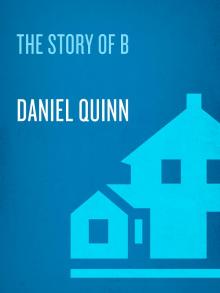 The Story of B
The Story of B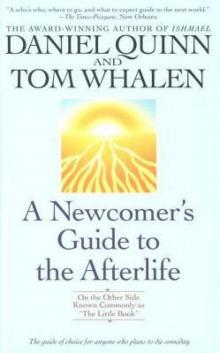 A Newcomer's Guide to the Afterlife: On the Other Side Known Commonly as the Little Book
A Newcomer's Guide to the Afterlife: On the Other Side Known Commonly as the Little Book Ishmael: An Adventure of the Mind and Spirit
Ishmael: An Adventure of the Mind and Spirit CLONES: The Anthology
CLONES: The Anthology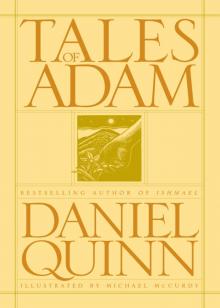 Tales of Adam
Tales of Adam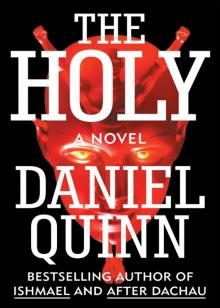 The Holy
The Holy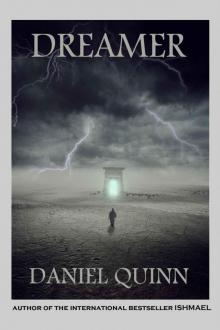 Dreamer
Dreamer Beyond Civilization: Humanity's Next Great Adventure
Beyond Civilization: Humanity's Next Great Adventure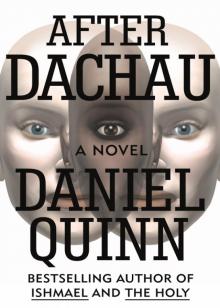 After Dachau
After Dachau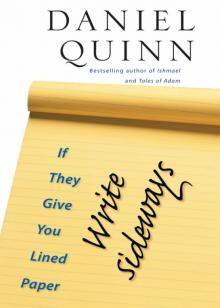 If They Give You Lined Paper, Write Sideways.
If They Give You Lined Paper, Write Sideways.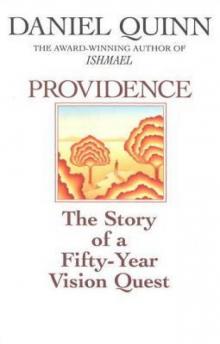 Providence
Providence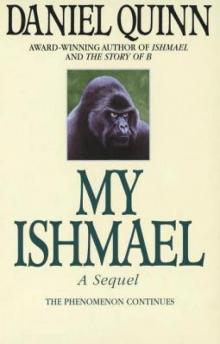 My Ishmael
My Ishmael Beyond Civilization
Beyond Civilization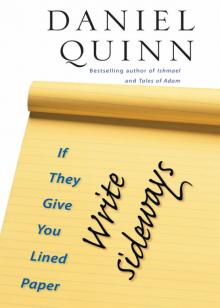 If They Give You Lined Paper, Write Sideways
If They Give You Lined Paper, Write Sideways Ishmael
Ishmael Ishmael i-1
Ishmael i-1 A Newcomer's Guide to the Afterlife
A Newcomer's Guide to the Afterlife